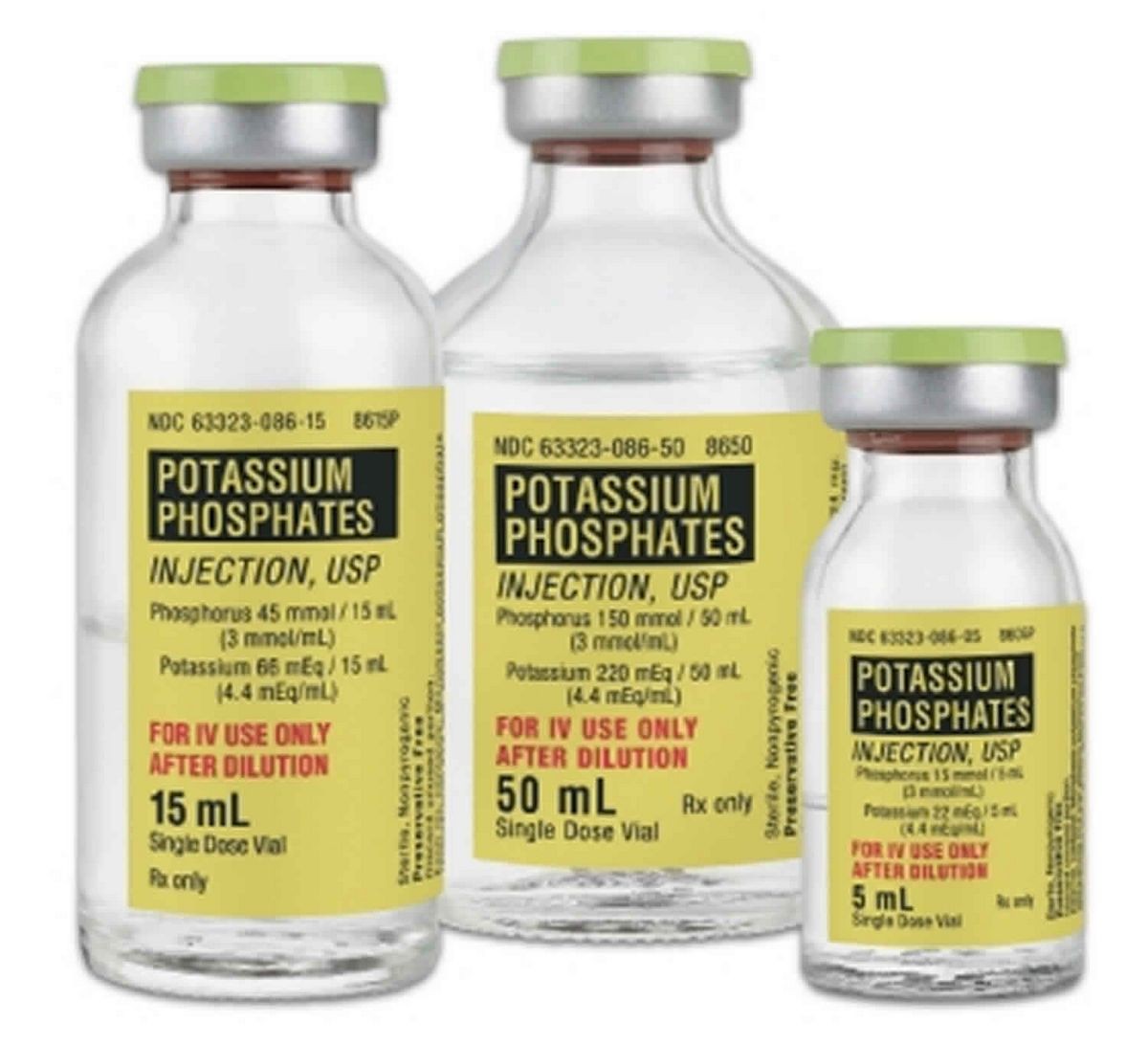
Contents
- 1 potassium phosphate/sodium phosphate
- 1.0.1 Warnings
- 1.0.2 What are the side effects of potassium phosphate/sodium phosphate?
- 1.0.3 What are the dosages of potassium phosphate/sodium phosphate?
- 1.0.4 What drugs interact with potassium phosphate/sodium phosphate?
- 1.0.5 Pregnancy and breastfeeding
- 1.0.6 What else should I know about potassium phosphate/sodium phosphate?
- 1.0.7 Summary
potassium phosphate/sodium phosphate
Potassium phosphate/sodium phosphate is used to correct low phosphate levels in the blood (hypophosphatemia) and urine and to acidify the urine. It is a combination salt of potassium and phosphorus and sodium and phosphorus.
Phosphate, in the form of phosphate, is an essential electrolyte in the body that has vital biochemical functions in metabolic processes and enzyme reactions in organs and tissues. It plays important roles in maintaining calcium levels, acid-base equilibrium, and excretion of hydrogen ions in the kidneys. Phosphate is essential for nucleic acid and cell membrane structure, energy storage and transfer, cell signaling, mineral levels, and bone mineralization.
Sodium regulates blood volume and extracellular fluid levels, while potassium is essential for nerve impulse conduction, muscle contraction, metabolism, gastric secretion, and kidney function. Potassium phosphate/sodium phosphate helps restore normal phosphorus levels in those deficient. It also acidifies the urine, making it more acidic, which helps keep urinary calcium soluble, reduces rash and odor caused by ammoniacal urine, and increases the effectiveness of certain antibiotics for urinary tract infections.
Uses of potassium phosphate/sodium phosphate:
- Phosphorus supplement in hypophosphatemia
- Increasing urinary phosphate and pyrophosphate
- Internal contamination with radioactive phosphorus
Warnings
- Avoid using potassium phosphate/sodium phosphate if you have:
- High phosphate levels
- Infected urinary phosphate stones
- Severe kidney impairment
- Cardiovascular diseases including:
- Heart failure for patients receiving digitalis therapy
- Hypertension (high blood pressure) patients
QUESTION
What are the side effects of potassium phosphate/sodium phosphate?
Common side effects include:
- Nausea
- Vomiting
- Stomach pain
- Gas (flatulence)
- Diarrhea
- Tingling and numbness in the mouth (oral paresthesia)
- Sore throat
- Swelling (edema)
- Lower extremity edema
- Chest pain
- Irregular heart rhythm (arrhythmia)
- Excessively slow or rapid heart rate (bradycardia or tachycardia)
- Shortness of breath (dyspnea)
- Confusion
- Dizziness
- Fatigue
- Headache
- Heaviness of legs
- Numbness
- Abnormal skin sensations (paresthesia)
- Tingling sensation
- Seizure
- Involuntary muscle contractions (tetany)
- Weakness (asthenia)
- Muscle cramps
- Weakness in muscles in the extremities
- Local pain in hands and feet
- Limb pain
- Bone pain (ostealgia)
- Joint pain (arthralgia)
- Paralysis
- Acute kidney failure
- Reduced urine output
- Increased thirst
- Weight gain
- High potassium levels (hyperkalemia)
- High alkalinity of body fluids (alkalosis)
Contact your doctor immediately if you experience serious side effects including heart symptoms, severe headache, nervous system reactions, or serious eye symptoms.
This is not an exhaustive list of side effects. Call your doctor or report side effects to the FDA.
What are the dosages of potassium phosphate/sodium phosphate?
Potassium phosphate/sodium phosphate
Tablet:
- 126 mg/67 mg
- 250 mg/298 mg
- 250 mg/160 mg
Hypophosphatemia:
- K-Phos Neutral: 1-2 tablets orally every 4 hours
- Phos-NaK: 1 packet mixed with 75 mL water or juice
Low Urinary Phosphate:
- 1-2 tablets orally every 6 hours
Dosage Modifications:
- Use with caution in patients with chronic renal disease or renal function impairment
Pediatric:
Hypophosphatemia:
- Children below 4 years: Safety and efficacy not established
- Children 4 years and above: K-Phos Neutral, 1 tablet orally every 6 hours; Phos-NaK, 1 packet orally every 6 hours mixed with 75 mL water or juice
Low Urinary Phosphate:
- Children below 4 years: Safety and efficacy not established
- Children 4 years and above: 1-2 tablets orally every 6 hours
Overdose:
- Potassium phosphate/sodium phosphate overdose can cause severe diarrhea and muscle spasms. Overdose may be treated with fluids and other supportive and symptomatic measures.
What drugs interact with potassium phosphate/sodium phosphate?
Inform your doctor of all medications you are currently taking to check for drug interactions. Avoid starting, stopping, or changing doses without your doctor’s recommendation.
- Severe interactions of potassium phosphate/sodium phosphate include:
- sodium phosphate rectal
- baloxavir marboxil
- erdafitinib
- potassium phosphates (IV)
- deflazacort
- dextroamphetamine
- lisdexamfetamine
- magnesium supplement
- methamphetamine
- methylenedioxymethamphetamine
- omadacycline
- potassium iodide
- pseudoephedrine
- sarecycline
Not all possible interactions are listed here. Consult your doctor or the RxList Drug Interaction Checker for more information.
Always inform your doctor, pharmacist, or healthcare provider about all prescription and over-the-counter medications you use, including dosage. Keep a list of this information. If you have any questions, consult your doctor or healthcare provider.
Pregnancy and breastfeeding
- Use potassium phosphate/sodium phosphate during pregnancy only if necessary and if benefits outweigh potential fetal risks. Use with caution in patients with preeclampsia (high blood pressure during pregnancy).
- It is unknown if potassium phosphate/sodium phosphate is present in breastmilk. Use with caution while breastfeeding.
What else should I know about potassium phosphate/sodium phosphate?
- Take potassium phosphate/sodium phosphate as prescribed.
- Undergo periodic lab tests and follow up with your physician.
- Inform your physician if it causes a persistent laxative effect.
- May precipitate the passage of pre-existing kidney stones.
- Avoid concurrent use of antacids or other medications containing aluminum, magnesium, or calcium as they may interfere with phosphorus absorption.
- Store safely out of reach of children.
- In case of overdose, seek medical help or contact Poison Control.
By clicking Submit, I agree to the MedicineNet’s Terms & Conditions & Privacy Policy and understand that I may opt out of MedicineNet’s subscriptions at any time.
Summary
Potassium phosphate/sodium phosphate is used to correct low phosphate levels in the blood and urine and to acidify the urine. It is a combination salt of potassium and phosphorus and sodium and phosphorus. Common side effects include nausea, vomiting, stomach pain, gas, diarrhea, tingling and numbness in the mouth, sore throat, swelling, chest pain, irregular heart rhythm, shortness of breath, and others.


